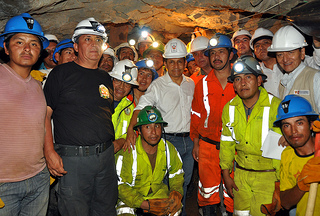
In Neighboring Chile and Peru, Mining Reforms Couldn't Be More Different
This article also in:
When it comes to mining policy, consensus is hard to find south of the Equator. Peru's government announced last week a package to speed up investment in the country after two quarters of poor economic performance. The package consists of a series of measures that would, among other things, limit environmental oversight and favor mining companies with 12 to 15 years of stabilization contracts.
Not surprisingly, the private sector has embraced the measures and demanded more, expressing confidence that congress will oblige. For the past three years, mining companies have advocated against the Ministry of Environment's sanctioning powers. The proposal plans to address those concerns. For starters, it weakens the Office of Evaluation and Environmental Control, which now may impose fines only as a last resort—and by 65 percent less than the current rates. Similarly, the ministry will no longer have the capacity to create land reserves or to establish air quality standards (functions reassigned to the Council of Ministers, with the express indication that their potential negative economic impact should be taken into account). Likewise, environmental officials are given extremely little time to provide opinion on environmental impact studies, which are approved by default if the deadline is missed.

Peru's president helped rescue miners in 2012. Now, the country’s mining industry is at a crossroads.
(Photo: Presidencia Perú / CC)
Chile faces similar challenges when it comes to mining investments. For example, the Chilean Environmental Evaluation Service reports that $10 billion in mining investments remain blocked following queries of indigenous communities appealing to the International Labour Organization Convention No. 169 on consultation rights.
However, the government's response could not be more different than that of its neighbor to the north, Peru. Indeed, Chilean president Michelle Bachelet has recently enacted changes that strengthen the Strategic Environmental Assessment Bill, giving it a leading role in public policy and regulatory plans, including land management. The administration has also announced that it wants to eliminate current stabilization arrangements with mining companies.
And many Chilean political leaders are up to that task. A group of influential political and business leaders and independent experts met with President Bachelet to propose mining sector reforms that push for fiscal decentralization in a country where royalties and taxes have long enriched the central government alone. It also suggests a rate hike for mining licenses to discourage speculation. Finally, it calls for Chile to adhere to the Extractive Industry Transparency Initiative to increase transparency and trust among stakeholders.
Ironically these initiatives, some of which could be perceived as negative for the private sector, did not stem from the progressive administration of President Bachelet, who only came to power a few weeks ago. On the contrary, the sector reform recommendations result from a cross-political effort between a highly respected private sector, civil society and government representatives over the past year. And the original proposal for the Strategic Environmental Assessment Bill was drafted by the conservative government of former president Sebastian Piñera.
In a broader perspective, the neighbors' divergent paths are a response to volatility in the global demand and price of minerals. While Chile plays catch-up with Peru in terms of fiscal decentralization, it is also pulling ahead in terms of strengthening its environmental institutions and eliminating tributary mechanisms that favor the mining industry. For its part, Peru is relaxing its environmental controls as a means to attract private investment, with potentially disastrous environmental consequences.
If their paths continue, they could one day find that a shared border is the only common ground between them.
Alonso Hidalgo is NRGI's information and communications assistant.
